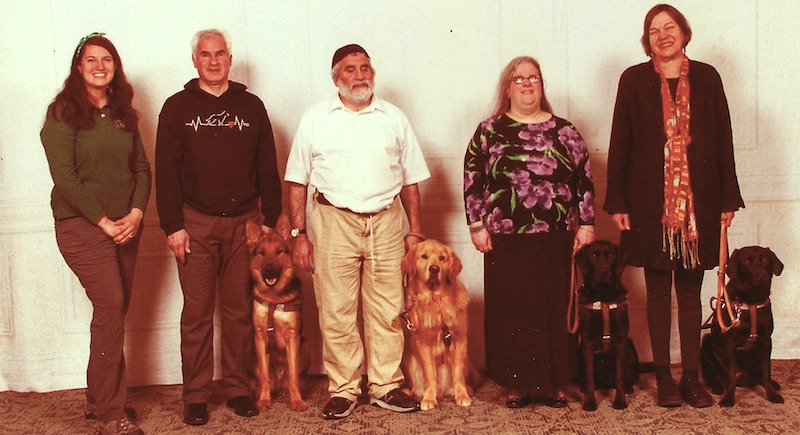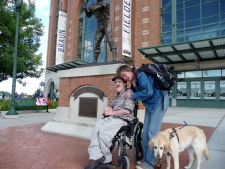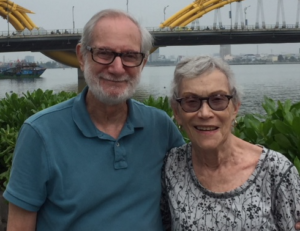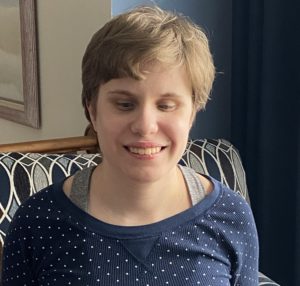Working with Seeing Eye dogs During a Pandemic, Part One
May 14, 2020 • 5 Comments • Posted in blindness, Seeing Eye dogs, travelRemember life in January? That’s when I spent three weeks in New Jersey at The Seeing Eye with 20-plus other blind people, all of us training with new Seeing Eye dogs . What a stroke of luck to have been matched with one-year-old black Lab Luna then. She’s the perfect dog for me, and I got her just in time: shortly after our class ended, the Seeing Eye had to make the very difficult decision to close the campus and cancel all classes for the foreseeable future.

My group’s graduation picture from the January class. I’m so lucky I got matched with Luna before the pandemic.
Nearly 2000 people in the United States and Canada currently work with Seeing Eye dogs, and last Friday The Seeing Eye invited all of us to a conference call with Glenn D. Hoagland, CEO and President, and Dave Johnson, Director of Instruction and Training. Other staff members joined in on the call to help explain how The Seeing Eye is continuing operations during the Coronavirus crisis. They started the call by sharing a timeline of recent events:
- the March, 2020 class started with caution
- students were scheduled for that class based on their geographic region and asked to self-report any symptoms of illness and/or cancel attendance prior to traveling to The Seeing Eye
- everyone who showed up for class on March 2 was temperature-checked upon arrival — anyone with a fever was sent home immediately
- the Seeing Eye campus was deep cleaned, and wiping of door knobs and hand rails continued throughout each day of training
- extra hand sanitizer dispensers were installed throughout the campus
- training for both dogs and students in New York City or other crowded destinations that month was eliminated
- public tours and other visits to The Seeing Eye campus were cancelled
Dave told us everyone there was paying close attention to the news, and every day another adjustment was made.
Whew. Training at the Seeing Eye can be intense under normal circumstances — imagine adding all that to the mix! Fifteen days into the March 2020 class, , amidst talk of the United states closing borders to Canada, The Seeing eye made the difficult decision to send all students home early with their new dogs and cancel upcoming classes as well.
Since then, most staff members have been working from home. The Admissions Department continues processing applications from people who are blind who are seeking a place in a future class, the Instruction & Training Department continues to provide follow-up support by phone or video conference to graduates who need it, and employees are still being paid.
So people at The Seeing Eye are being cared for, but what about the dogs at The Seeing Eye? Over 200 dogs had been living at the Seeing Eye campus and breeding station when the campus shut down in March. Some were puppies waiting to be placed with volunteer puppy raisers, many dogs were in the midst of training, and dogs who’d completed training were all set to be matched with blind companions who would have been arriving in April.
So The Seeing Eye couldn’t shut down completely. Employees who worked directly and cared for the school’s amazing dogs at the veterinarian offices, the breeding station, the kennel, all continued coming in person, working in areas where they could maintain a safe six foot distance from others. They wore protective equipment and yes, they washed their hands.
As the number of COVID cases in New Jersey started to soar, keeping Seeing Eye employees safe became paramount, and staff got to work finding new temporary housing outside of campus for the kenneled dogs and puppies at the breeding station.
All in all 203 dogs — 88 of them puppies — were transferred to local puppy raisers, staff members, and families. “All those dogs placed in ten days,” Dave marveled over the phone. “They’re all living the good life with families right now — some families took more than one dog, too!”
“We are making adjustments every single day, we work well as a team, and that’s what we do here, ” said Angela McDyer, Manager of Graduate Services and Admissions. As to when classes will start up again? “Everything is off the board, some people are talking about how they’re sure they’ll be in the first class once the Seeing Eye opens again, but wee don’t know if we can constantly stick to the class schedule the way we did before. We’re in a really hard position, and the part I hate the most is the questions we get that I can’t answer.”
When will the dogs be able to return to campus? Will they still be able to train and match as many dogs? When will instructors be able to come out in person for follow-up visits again? Will classes be as big as they were before? How long will New Jerssey be quarantined?
”Classes at the Seeing Eye represent a real melting pot, we bring students in from all over North America, many of them by plane,” Dave Johnson reminded us. He acknowledged that once the Seeing eye reopens they’ll be limited at first as to how many they can take care of at one time. “We just don’t know how many can come, we don’t even know if we can send staff out to visit students, we need to pay attention to so many things, and safety of staff and students is critical.”
New Jersey is second in the list of states for the most U.S. coronavirus cases (after New York) and the quarantine there has been extended into June. “Everyone here is as eager as you graduates are to get back to work,” Angela told us. “But the virus is driving this whole thing.” The call came to an end about then, and Angela left us with a Helen Keller quote I hadn’t heard before:
“Alone we can do so little, together we can do so much.”
Wondering how/if Luna’s ongoing training has been affected by stay-at-home orders? Stay tuned for Part Two, where I’ll give you a Luna update. Have questions of your own? Leave them here as a comment, and I’ll do my best to answer in my next post.



